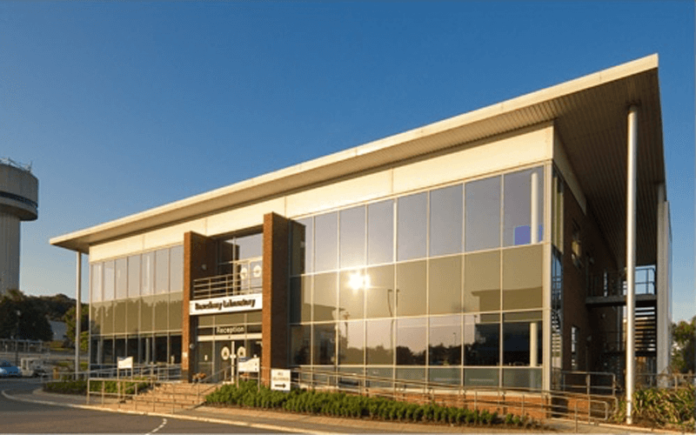As Daresbury Laboratory celebrates 60 years at the cutting edge of science and innovation, it also looks forward towards a continued future of milestone breakthroughs, inspiration and job creation, benefitting our economy and society.
Since 1962, Daresbury Laboratory has pushed the boundaries of modern science. Today, with its iconic Tower, it is recognised worldwide across a range of scientific fields, from nuclear physics to supercomputing and many in between.
Part of the Science and Technology Facilities Council (STFC) and located at Sci-Tech Daresbury in the Liverpool City Region, it enables research that positively impacts society, from new cancer therapies, to cleaner fuel and energy.
Pioneering scientific invention
A focal part of Daresbury’s history, and which has played a significant role in what it is today, is undoubtedly the Synchrotron Radiation Source (SRS). One of the most pioneering scientific inventions of its time, it played a key role towards a share of two Nobel Prizes in Chemistry.
Generating light billions of times brighter than the sun, this particle accelerator revealed the structure of atoms and molecules inside materials, enabling research into diseases such as HIV and motor neurone disease. Research into the structure of the Foot & Mouth virus led to the development of a vaccine and was the first animal virus structure to be determined in Europe.
Since its closure in 2008, the impact of the SRS continues to be far reaching, leading to the development of many similar facilities around the world, of which there are now at least 70, with technologies and skills originating from Daresbury still in use.
Inspiration technologies of the future
Today, Daresbury’s scientists, engineers and technicians continue to play a key role in designing and building the newest generations of particle accelerators across the world. These include the Large Hadron Collider at CERN in Switzerland, as well as a host of ground breaking facilities currently under construction in both the US and Europe.
Daresbury is also home to CLARA, a one-of-a kind particle accelerator designed to develop, test and advance new accelerator technologies of the future.
Most recently, it has enabled researchers to carry out experiments they cannot do anywhere else in the UK, including research to develop new proton imaging technologies for cancer detection, and our next generations of radiotherapy for targeting tumours that are hard to treat.
Paul Vernon, Head of STFC’s Daresbury Laboratory said: “It is with so much pride that I reflect on the success of 60 years of Daresbury Laboratory, and how it has helped change our world for the better in so many ways.
Every day there’s incredible research happening right here which has the potential to improve our lives.
“We remain today as committed as we have ever been to supporting excellent research and providing access to world-class research facilities and expertise to solve real world challenges.”
Supercomputing for our economy, society and planet
The cutting-edge science and results emerging from the early days of the SRS led to the establishment of the internationally recognised Scientific Computing Department at Daresbury, and subsequently to the opening of the Hartree Centre, exactly 10 years ago.
Home to some of the UK’s most advanced technologies in computing, data science and Artificial Intelligence (AI), the Hartree Centre is one of the UK’s only supercomputing centres dedicated to industry applications.
Here, businesses can access specialist expertise and supercomputers that are normally only available to academia and large-scale industry, reducing the time and cost of developing new products.
Amongst many other projects, the Hartree Centre is currently collaborating with the UK Atomic Energy Association (UKAEA) to develop fusion technologies for a low carbon future with supercomputers and AI.
A new, state-of-the-art Supercomputing Centre
The recently launched £210 million Hartree National Centre for Digital Innovation (HNCDI), a collaboration with IBM, enables companies large and small to discover how the latest AI and quantum computing technologies could benefit their business.
Putting the UK at the forefront of AI and digital innovation not only requires the latest in supercomputing technologies, but also in infrastructure and data security requirements. To support this, planning and preparatory work is now complete and ready for construction to begin of a new, state-of-the-art, 33,000ft2 Supercomputing Centre.
STFC’s Kate Royse, Director of the Hartree Centre, said: “The Hartree Centre is committed to providing an environment where UK science and businesses can be at the forefront of the latest digital technologies, such as AI and quantum computing.
These technologies have the real potential to revolutionise our lives, and could help us to re-think how we solve the world’s problems, from climate change to security. With our support, businesses can explore these technologies at reduced risk for increased productivity and competitiveness.
As we also celebrate 10 years of the Hartree Centre, there has never been a more exciting time to work in this field, and I can’t wait to see what the next decade brings.”
Innovation, collaboration, enterprise and job creation
In 2006, the expertise, facilities and industrial links created around the scientific facilities and expertise at Daresbury Laboratory led to the Government’s creation of the successful and vibrant campus we know today as Sci-Tech Daresbury.
A joint venture between STFC, property developer Langtree and Halton Borough Council, it integrates world-class science, technology and business enterprise to benefit the economy and drive forward 10,000 jobs by 2030.
Today, the rapidly expanding campus is home to more than 150 technology companies, ranging from pioneering high-tech start-ups to major international firms such as IBM Research, Hitachi Hi-Tech Europe and Croda.
The science of business success
Small businesses are critical to the health of our economy, and the commitment to support them at Sci-Tech Daresbury remains stronger than ever.
Whether this is through the range of business incubation programmes available, or access to cutting edge laboratory or office space, businesses are accessing the support and technologies they need to succeed and grow. This commitment was re-enforced recently by the creation of three industrial clusters, dedicated to supporting HealthTec, Space and Digital businesses.
The effect this support has had on the success and resilience of businesses located at the Campus is significant, with the campus now home to more thriving start-ups than before the Covid-19 pandemic. Key to this support is the Home for Life ethos, a set of principles that allows businesses to achieve their ambitions within the Campus, with firms offered the technical support, world-class facilities and access to local and national networks needed in order to become trailblazers in their chosen field.
John Downes, Chief Executive Officer of Langtree and Director of Sci-Tech Daresbury, said: “I would like to congratulate Daresbury Laboratory on 60 years of trailblazing and inspirational science and innovation. The groundbreaking work undertaken with the SRS set a benchmark for what can be achieved on our campus, and I’m very proud that companies based at Sci-Tech Daresbury keep that legacy alive today by delivering pioneering work in a range of industries in order to improve the world around us while creating tangible economic benefits for the Liverpool City Region.”
Inspiring a new generation of scientists
As a major employer in the region for 60 years, Daresbury Laboratory places great importance on providing opportunities and training for our future generations.
Work experience opportunities and a successful apprenticeship programme are a key part of securing the skills needed to support the ongoing job creation and growth of the campus, with almost 60 apprentices on site working across a whole range of roles.
Paul Vernon said: “The range of skills and talents needed for the UK to thrive as an innovation nation is huge and under-recognised. People are our opportunity, and investing in talented young people will unleash the region’s full potential.
“As a proud partner of Sci-Tech Daresbury, we are committed more than ever to putting apprenticeships and training at the heart of what we do. With almost 60 apprentices working across a range of roles, our apprenticeship scheme continues to grow.
“Celebrating our 60th anniversary of is an immensely proud moment for all of us here at Daresbury Laboratory. I would like to thank all who have contributed to its growth, many of whom have dedicated their entire careers to Daresbury. I look forward with great anticipation to our next 60 years, celebrating the continued successes of the facility, made possible thanks to the dedicated staff both now and in the future.”







